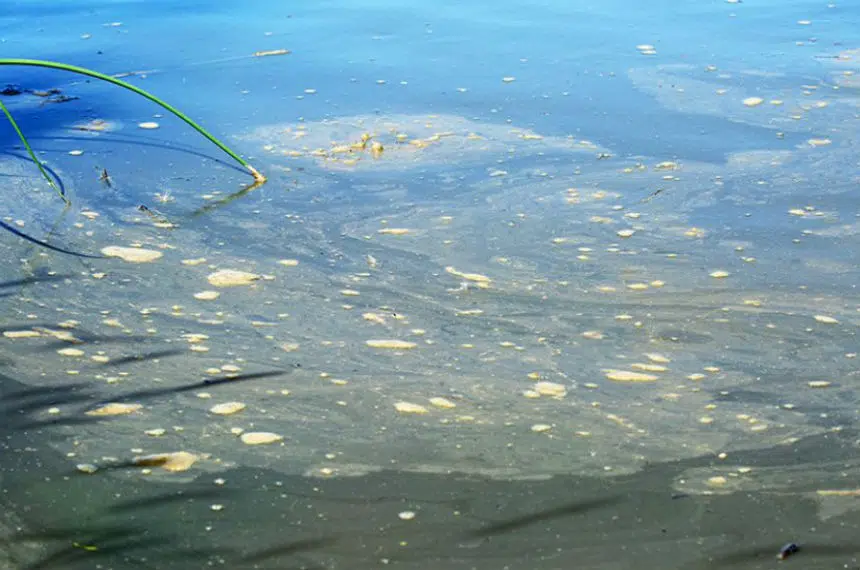LLOYDMINSTER, Sask. — Husky Energy has been fined $3.8 million for a pipeline leak that spilled oil into a major river and tainted the drinking water supply for thousands of people in Saskatchewan.
The spill into the North Saskatchewan River in July 2016 forced the cities of North Battleford, Prince Albert and Melfort to shut off their water intakes for almost two months.
Calgary-based Husky pleaded guilty Wednesday in provincial court in Lloydminster, Sask., to three environmental charges.
About 225,000 litres of diluted heavy oil spilled from Husky’s pipeline near Maidstone in west-central Saskatchewan, and the company said about 40 per cent made it into the river.
Judge Lorna Dyck accepted a joint recommendation from lawyers for the amount of the fine.
“This case has been a difficult and a challenging one for a number of reasons,” she said in her decision.
She noted that two alarms had gone off but were not recorded or reported to senior staff.
“Once the leak was discovered, Husky acted quickly and properly,” said the judge.
“I believe Husky has learned from this mistake.”
The two federal charges under the Fisheries Act and the Migratory Birds Convention Act relate to the deposit of a harmful substance into water frequented by fish and birds. The provincial conviction is for “allowing the discharge of a substance … into the environment” causing an adverse effect.
The federal Crown withdrew seven other charges.
Brad Gilmour, a lawyer for Husky, apologized for the spill in court.
“There is no question that this was a very serious and significant event. Husky is sincerely regretful,” he said.
“Husky acknowledges that the incident resulted in actual harm … it had impacts on downstream communities, as well as the environment.”
Birds and fish are likely to have died as a result, he added.
“There has never been an environmental incident as significant as this in the province,” Saskatchewan prosecutor Matthew Miazga told court.
“Literally tens of thousands of people downstream were impacted.”
Federal prosecutor Stephen Jordan said Husky has taken steps to ensure such a spill never happens again.
About 40 per cent of 225,000 litres of diluted heavy oil from Husky’s pipeline near Maidstone in west-central Saskatchewan made it into the river. It caused an oil plume that flowed hundreds of kilometres downstream.
The charges were announced in May 2018 after a 19-month joint federal-provincial investigation.
Husky had already apologized for the spill and said it accepted full responsibility. The company said the pipeline buckled and leaked because of ground movement.
The pipeline was allowed to restart in October 2016 after being repaired and inspected.
The company pegged the cleanup cost at more than $107 million. Husky said more than 90 per cent of the oil was recovered.
A victim impact statement filed by three Indigenous communities in the area said the cleanup wasn’t good enough. Chief Wayne Semaganis spoke on behalf of his Little Pine First Nation and also for the Sweetgrass and Red Pheasant bands.
He said birds, wildlife and fish such as walleye and northern pike still suffer the effects of the oil contamination. As a result, the First Nations have lost traditional use of their land.
“We no longer fish in the river. We no longer trap on or near reserve lands. We no longer farm on or near reserve lands,” he said.
“We no longer drink water drawn from reserve lands. In fact, many will only drink bottled water.”
Semaganis said the Indigenous communities are still feeling the impact of the spill and residents remain anxious, fearful and psychologically stressed.
“We are absolutely clear about two facts … the cleanup of the contamination is inadequate and incomplete.”
The cities of North Battleford and Prince Albert also filed victim impact statements that were read out by the Crown.
“The impact was dire, ongoing and will cause long-lasting changes to procedures and processes,” said the statement from North Battleford’s city manager James Puffalt.
Prince Albert’s statement said the spill caused significant disruption and stress for residents and had considerable costs.
Spray parks were closed at the peak of the summer holidays. Laundromats were shut down. Car washes couldn’t operate and businesses had to close.
“The city was forced to implement its emergency operations centre,” said the statement.
In addition, the city had to lay temporary lines to two nearby rivers for drinking water.
Colette Derworiz, The Canadian Press







